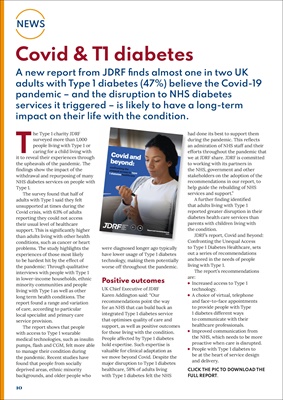
10
NEWS
Covid & T1 diabetes
A new report from JDRF finds almost one in two UK
adults with Type 1 diabetes (47%) believe the Covid-19
pandemic - and the disruption to NHS diabetes
services it triggered - is likely to have a long-term
impact on their life with the condition.
The Type 1 charity JDRF
surveyed more than 1,000
people living with Type 1 or
caring for a child living with
it to reveal their experiences through
the upheavals of the pandemic. The
findings show the impact of the
withdrawal and repurposing of many
NHS diabetes services on people with
Type 1.
The survey found that half of
adults with Type 1 said they felt
unsupported at times during the
Covid crisis, with 63% of adults
reporting they could not access
their usual level of healthcare
support. This is significantly higher
than adults living with other health
conditions, such as cancer or heart
problems. The study highlights the
experiences of those most likely
to be hardest hit by the effect of
the pandemic: Through qualitative
interviews with people with Type 1
in lower-income households, ethnic
minority communities and people
living with Type 1 as well as other
long term health conditions. The
report found a range and variation
of care, according to particular
local specialist and primary care
service provision.
The report shows that people
with access to Type 1 wearable
medical technologies, such as insulin
pumps, flash and CGM, felt more able
to manage their condition during
the pandemic. Recent studies have
found that people from socially
deprived areas, ethnic minority
backgrounds, and older people who
were diagnosed longer ago typically
have lower usage of Type 1 diabetes
technology, making them potentially
worse off throughout the pandemic.
Positive outcomes
UK Chief Executive of JDRF
Karen Addington said: "Our
recommendations point the way
for an NHS that can build back an
integrated Type 1 diabetes service
that optimises quality of care and
support, as well as positive outcomes
for those living with the condition.
People affected by Type 1 diabetes
hold expertise. Such expertise is
valuable for clinical adaptation as
we move beyond Covid. Despite the
major disruption to Type 1 diabetes
healthcare, 58% of adults living
with Type 1 diabetes felt the NHS
had done its best to support them
during the pandemic. This reflects
an admiration of NHS staff and their
efforts throughout the pandemic that
we at JDRF share. JDRF is committed
to working with its partners in
the NHS, government and other
stakeholders on the adoption of the
recommendations in our report, to
help guide the rebuilding of NHS
services and support."
A further finding identified
that adults living with Type 1
reported greater disruption in their
diabetes health care services than
parents with children living with
the condition.
JDRF's report, Covid and Beyond:
Confronting the Unequal Access
to Type 1 Diabetes Healthcare, sets
out a series of recommendations
anchored in the needs of people
living with Type 1.
The report's recommendations
are:
Increased access to Type 1
technology.
A choice of virtual, telephone
and face-to-face appointments
to provide people with Type
1 diabetes different ways
to communicate with their
healthcare professionals.
Improved communication from
the NHS, which needs to be more
proactive when care is disrupted.
People with Type 1 diabetes to
be at the heart of service design
and delivery.
CLICK THE PIC TO DOWNLOAD THE
FULL REPORT.